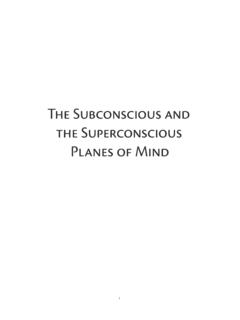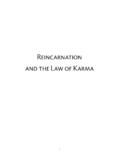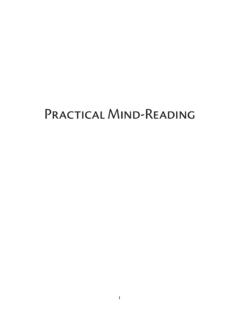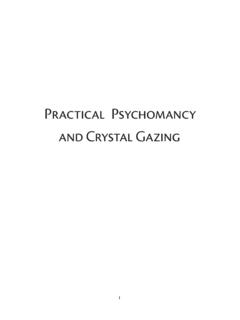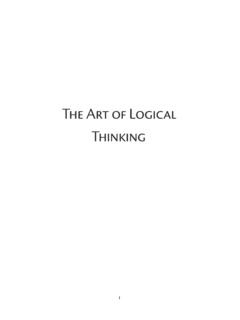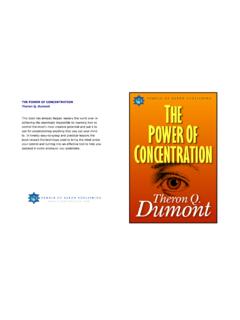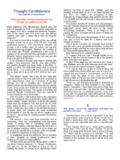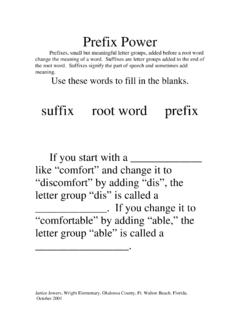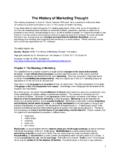Transcription of Thought Vibration - YOGeBooks
1 Thought Vibration iThought Vibration iiThought VibrationThe Law of Attraction in the Thought WorldWilliam Walker AtkinsonYogeBooks: Hollister, MO iiiYogeBooks by Roger L. Cole, Hollister, MO 65672 2015 YOGeBooks by Roger L. ColeAll rights reserved. Electronic edition published 2015isbn: 978-1-61183-062-0 pdfisbn: 978-1-61183-063-7 epub2016:05:07:11:16 text of this ebook is in the public domain, but this ebook is not. Please do not distribute it without Vibration which we learn something of the author and how the book was December, 1901, William Walker Atkinson in assuming the editorship of the popular magazine New Thought , introduced himself to the readers of that periodical in a memorable article.
2 That article contained a clear, ringing, forceful statement of his individual creed, than which nothing can afford a deeper insight into the character and inner self of the man whose name appears as author of this book. It is the crystallized expression of the world-principles, the truths, which his writings seek to illuminate, and in my opinion should be read by every student of his works, as the key to the philosophy he this reason there has been prefixed to this, his latest book, under the title My Working Creed, the most vital of the fundamental beliefs enunciated by Mr. Atkinson in that famous introductory statement of 1901. None can read the recurring, ringing I Believe of this author, without feeling an answering thrill of exaltation and power. To those who read this book I would say, imbue yourself thoroughly with the broad and beautiful spirit of those few preliminary paragraphs that you may pass on understandingly to the perusal of the teachings which vThose who have an opportunity to refer to the article from which this Creed is taken, should do It tells of the work, the material success, followed by over-strain, physical and mental breakdown and financial disaster, which marked the earlier years of William Walker Atkinson.
3 It shows how he came to know what he now holds to be the truth, and how, in his own life, he has demonstrated its value. For from mental and physical wreck and financial ruin, he wrought through its principles, perfect health, mental vigor and material Atkinson, during the many years of his connection with the magazine, New Thought , built for himself an enduring place in the hearts of its readers. For four years his literary work was confined to its pages (including in addition, three books for its publishers), and article after article of wonderful strength and vital force flowed from his pen. During this time several series of lessons appeared, under varying titles, in regard to the application of the Law of Attraction in the Thought World, lessons which created a sensation and exerted a wonderful influence upon the lives of those who applied their principles. They were written in Mr.
4 Atkinson s own sparkling, intimate style, teeming with Thought , force, energy, fire, but shorn of all atmosphere of the study, all attempt at fine writing, polished periods or dignified metaphor, and all affectation or assumption of superior learning. One of Mr. Atkinson s cardinal principles is Stand on your own feet, and he deprecates any attempt to read infallibility into his writings. For this reason we have again prefaced the present work with a Foreword in which he seeks to instill into all students of New Thought , whether as expressed in his writings or in those of others, the quality of self-dependence. A reading of this Foreword will give the student a clear idea of the attitude of mind in which Mr. Atkinson thinks this and all other individual interpretations of life should be Included in New Thought Annual for 1902 published by The New Thought Publishing Vibration viWith My Working Creed and the Foreword as guides, the present reader should enter upon Thought Vibration , the book proper, in a spirit calculated to extract the greatest possible Vibration embraces two series of the vital lessons mentioned above, with some additional articles by Mr.
5 Atkinson following out the same line of teaching. The order of the lessons has been somewhat changed in the combination; and for further continuity and clearness, new lesson titles in the form of chapter headings have been selected. The publishers have preferred to retain the familiar unstudied style of the lessons, as originally written, rather than to subject the articles to the literary revision by the author which usually precedes publication in book form. They contend that Mr. Atkinson s mightiest influence, his greatest strength and power, lies in his simple, straightforward, and at times even colloquial language the kind which even my little son can understand, as wrote in gratitude one earnest student. It is such writing that the world needs, writing which can be read and apprehended by the little sons of the world, whether known as children or as men. There is a great deal of so-called fine writing on New Thought subjects, beautiful sentences full of high, though sometimes misty Thought ; but this world needs common, practical, everyday application of this Thought .
6 Where there is one reader for the literary masterpiece, there are a hundred readers (plus even that other one), for the book written as a keen, live, human man talks, and written about the difficulties, the problems, the possibilities of the average citizen of the is a truth Mr. Atkinson has mastered, and it is with intention he casts from him the restrictions of an academic style. He speaks, always, not in dignified tones to the public, but in the language of a friend to you. It can be said of him in praise, as of another before him: The common people heard him gladly! the highest, most enduring tribute that can be paid to a leader of viiRecognition is due to Louise Radford Wells for the revision of the proofs of this book, the selection of its title and chapter headings, and the ordered arrangement of the L.
7 Berry,Editor of New 15, 1906 Chicago, Vibration viiiContentsPreface. vForeword. xiMy Working Creed. xviiChapter I. The Law of Attraction in the Thought World. 3 Chapter II. Thought -Waves And Their Process Of Reproduction. 9 Chapter III. A Talk About The Mind. 17 Chapter IV. Mind Building. 23 Chapter V. The Secret of the Will. 27 Chapter VI. How to Become Immune to Injurious Thought Attraction. 33 Chapter VII. The Transmutation of Negative Thought . 37 Chapter VIII. The Law of Mental Control. 43 Chapter IX. Asserting the Life-Force. 45 Chapter X.
8 Training the Habit-Mind. 49 Chapter XI. The Psychology Of Emotion. 53 Chapter XII. Developing New Brain-Cells. 57 Chapter XIII. The Attractive Power Desire Force. 63 Chapter XIV. The Great Dynamic Forces. 67 Chapter XV. Claiming Your Own. 73 Chapter XVI. Law, Not Chance. 79 Contents ixWritings 83 Bibliography 85 Thought Vibration which the author has a word to say about teachers and disciples, himself am in receipt of a letter from an earnest student of New Thought , who writes me that he is endeavoring to put into practice the teachings for which I stand.
9 That is all right I think he will get some good out of the practice (I know that I do). But here is where the trouble comes in he goes on to say that he is a faithful disciple of mine, and is content to sit at the feet of the Teacher. Now, if you will pardon the slang, I must say that such talk makes me tired. I wish no disciples disciples are mere parrots repeating what one says mere human sheep trotting along after some conceited old bell-wether. I do not wish to pose as a bell-wether, nor do I wish a flock of human sheep trotting after me. I want everyone of my fellow students of Mental Science to be his own bell-wether. I like comradeship and mutual help the help of interdependence. But I don t like this talk of master and disciple of leader and follower this talk and idea of for sitting at anyone s feet, the idea arouses all the spirit of independence within me. I don t want to sit at any one s feet and I don t want any one to sit at mine.
10 I am willing, and often glad, to listen to some teacher and to pick from his teachings such bits of truth as my mind is ready to receive. I am Foreword. xiwilling to say I don t know, and to accept from others that which appeals to me as truth; not because the other says that it is truth, but because my mind recognizes it as such. I take my own wherever I find it, because I recognize it as mine. I know that all students and teachers get their knowledge from the only source of supply they can t get it from anywhere else. And if some other fellow happens to see a particular bit of truth before I do, I gladly accept a portion of it from his hands, be he king or beggar; while if I happen to see the thing first, I will gladly share it with all who are ready for it, and who may want it, without feeling that I am a leader, or teacher, or that they are followers or disciples.
